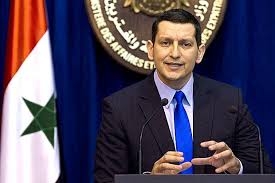Is there any hope? People often ask me this question, especially after a trip with political activities, just like my last trip to Vienna. I wish the answer was as simple as ‘yes’ or ‘no’, but sadly, in our case I think it is more complicated than it appears. Whether the answer is yes or no, there is also always a ‘but’.
I must also clarify that my being in Vienna had nothing to do with the ministerial meetings of Vienna. I only went there to attend some political meetings as an independent member of the 'Platform' (the committee of the Cairo Conference for the Syrian Opposition and National Forces), and because of the presence of all the regional and international parties involved in the Syrian file in one place.
We had about 10 political meetings with parties who already believe – or have recently started to believe – in a political solution "exclusively" for the war in Syria (I believe you all know what I'm talking about). By the way, I deliberately mention all my activities here on my page for a certain purpose, which is my concern of transparency. This is a public problem not a personal one, and all the meetings I attend (either personally or as a part of this committee) is an attempt to contribute in the peaceful efforts to find an applicable, non-cosmetic political solution in my country, Syria.
In light of the multiple wars in Syria (agency, terrorism, authority against opposition and vice versa), Vienna was a place for a new war that will end all the other wars, a "war of wills" that is happening around a table supervised by the UN, but in fact it is the table of the US-Russian negotiations.
On this table, the US seems stronger while Russia seems more comfortable in regards to international law (just a point of view). Yes, Syrians were absent from these meetings, and I can't see why this sudden resentment, they have been absent ever since each party of them had chosen a supporter that bypassed the natural limits of support and started acting alone. When have states become charities?
Anyway, and to stay on topic, in Vienna there were views that preferred the regional consensus as the perfect and only solution, and thus Syrians are absent and they are given solutions under the pretext that they are divided, which is true. Other views suggest that the opposition must work together without the need to merge, to be able to negotiate the authority on the basis of the Geneva statement, and to choose a political solution that fits the Syrian will in light of international specifications that guarantee that the political process will go in the right direction.
Some voices object and say that the current authority will stall and will not give up anything just like before, or that it is about to make a “cosmetic” reform that will only reproduce similar authority. The responses to these voices as we've been told were that the way things are going, the timing and the Russian factor as well, shows a kind of maturity that cannot be discovered except through direct political negotiations.
I think that the international party that supports the political process forms the majority of the parties attending these meetings, and this is an opportunity that may never occur again. The seriousness of the Syrian situation threatens the regional security and its consequences are much more important than the fate of any authority. Of course there is an international awareness of the dangers of terrorism and jihadists in Syria, but if this stubbornness continued then the consequences would be so dangerous, and not necessarily in the favor of the typical analysis that are based on "I told you so" cliché.
Other important and essential files were mentioned as well, such as the identity of the state, maintaining the unity of Syria, the political transition period, and maintaining the state institutions. There was also the mention of the authorities and constitutional amendments (prior to or post parliamentary and presidential elections), which makes a great difference in terms of the kind and depth of these amendments and their effect on the results (everyone has in mind the disadvantages of the Yemeni model, where the amendments were supervised by the authority itself).
The international consensus on all the mentioned files was not complete. There will be a new round of talks in Vienna that might happen in two months. However, there are more important issues that should be solved in terms of the opposition coordination (without the need to merge with one another), in order to be able to face new upcoming negotiations. One of the major countries might host (but not interfere in) a conference that may come up with a coordination mechanism for the opposition. This thing may enhance the seriousness and the results of the political negotiations that will be soon launched.
In short, there is a large and serious international momentum that must be used, and that could result in a full consensus on a clear negotiated political process, and this may put the decision making back in the hands of the negotiating Syrians. This political process is inevitable and it will happen even though it will not be short. Going back to the beginning, and to answer the question: Yes, there is hope, but it will not fall from the sky, we Syrians must make it in the right moment.
This article was edited by The Syrian Observer. Responsibility for the information and views set out in this article lies entirely with the author.


